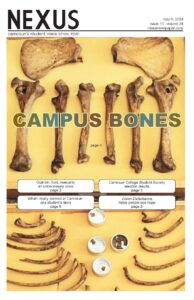Stop wasting food, Canada—starving students have suffered enough.
Post-secondary students across Canada are grappling with food insecurity, a stark reality that hinders their ability to thrive academically and personally. With rising tuition fees and housing costs, and limited financial aid, many students find themselves unable to afford nutritious meals regularly. The resulting conditions are poorer physical health, poorer mental health, and poorer academic achievement.

The burden is especially heavy on marginalized communities and international students who face additional financial barriers. For international students, trying to acclimate to new traditions, expectations, and resources in a different country is challenging. They often cannot access healthy foods that fulfill their food preferences and dietary needs; it can also be difficult to source culturally appropriate food. Food banks on campuses are witnessing increased demand, highlighting the depth of the issue. For these students, the dilemma isn’t just about hunger—it’s about the fundamental right to access necessities while pursuing education.
Working against food insecurity among post-secondary students in Canada means addressing a pressing social-justice issue and making a tangible difference in people’s lives. By combating food insecurity, we all contribute to creating a more equitable society where everyone has access to essential resources, regardless of their socioeconomic background. Working on this issue allows people to advocate for policies that support affordable education, promote community-driven initiatives like food banks and meal programs, and foster awareness about the challenges faced by marginalized student populations. Ultimately, addressing food insecurity among students is not just about providing meals—it’s about empowering individuals to fulfill their potential and ensuring that education remains a pathway to opportunity for all.
Here’s food for thought: Canada does not have a food shortage. In fact, according to food-rescue non-profit Second Harvest, a whopping 58 percent of food gets wasted annually. One study from last year found that 19.2 percent of the general population in Canada suffers from food insecurity. Even more telling is a survey from fall 2021 of 6,167 students from 13 Canadian university campuses: it found that 56.8 percent of students were moderately or severely food insecure. These high numbers have increased demand for wider-scale discussions at the federal and local levels, including conversations around food subsidies, tuition supports, and a basic income program.
We’re all accountable to help reduce food waste and must do a better job. Food that’s grown and produced but ends up not being consumed will fill our landfills and produce methane gas.
Let’s check our own habits; don’t buy and stock up on more food than you’ll consume, or else you run the risk of the food spoiling before you can eat it. Plan your meals before going to the grocery store. Is it more work? Sure. Will it reduce food waste? Absolutely.
If you do have more food at home than you need, you can always donate it to food banks before it spoils and goes to waste. It will come back around to you. If changes aren’t made across the board and students in Canada don’t get some relief, this unnecessary crisis will only worsen.
